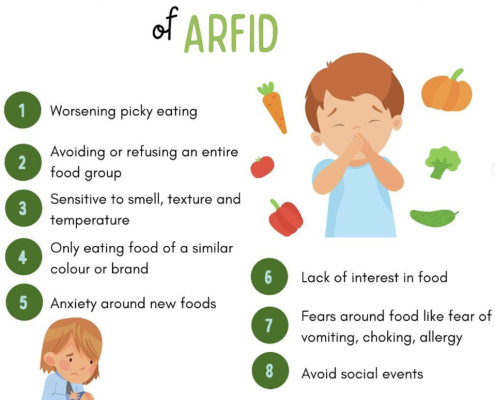Avoidant Restrictive Food Intake Disorder (ARFID) was formally recognised as a diagnosable mental health disorder within the past ten years and was previously known as “selective eating disorder”. ARFID is an eating challenge which may present as an apparent lack of interest in eating or food, an avoidance of food based on the sensory characteristics of food or a concern about unwanted consequences of eating (e.g., choking or being sick). Individuals may experience just one or all of those characteristics of ARFID.
An individual with a diagnosis of ARFID does not meet their nutritional needs with their safe range of foods and may experience weight loss, significant nutritional deficiencies, dependence on enteral feeding or have altered psychosocial functioning. A major difference between ARFID and other eating disorders, is that an individual’s diet is not influenced by their body weight or shape (such as anorexia nervosa or bulimia nervosa).
Supporting an individual with ARFID using a multidisciplinary approach is extremely important to ensure their health is not compromised. At Lively Eaters, our team of multidisciplinary therapists have experience and knowledge in working with children and young people with ARFID. Liaising with clinicians in other care settings such as General Practitioners, Psychologists, Psychiatrists, Occupational Therapists, Behaviour Therapists and more, might be appropriate to provide adequate care for the individual. Setting clear goals with our clients assists in managing ARFID and ensuring that our support is client centred and functional for each person.
Many parents ask us if their child meets the diagnostic criteria of ARFID. If it is applicable for the child and family, we can provide advice as to how to have this assessed by a Psychologist or Psychiatrist. Many children and young people that Lively Eaters support do not have a diagnosis of ARFID, but this does not change our approach in their care. We will always listen to the needs of the family to overcome their feeding challenges.
If you have concerns about your child’s eating behaviours, please follow the prompts on the “Contact Us” page of our website.




